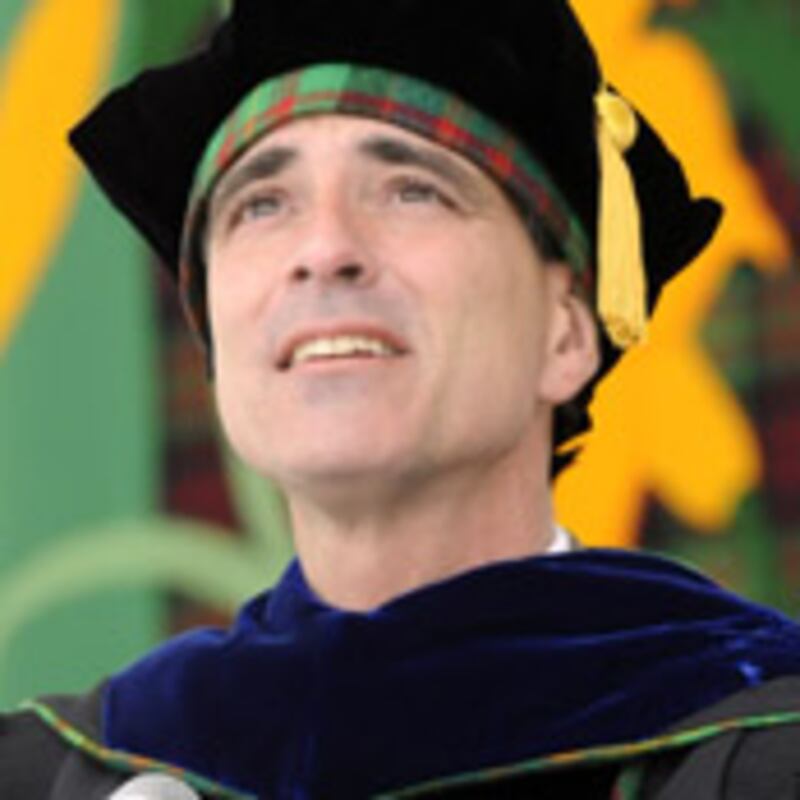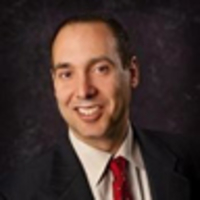
Today is the first anniversary of Randy Pausch's death at the age of 47. Pausch, a computer scientist at Carnegie Mellon University skyrocketed to fame after his so-called "Last Lecture"-a rousing talk in which he encouraged his three young children to never give up their childhood dreams and did Rocky-style pushups after showing a picture of the 10 tumors on his liver that had metastasized from pancreatic cancer. The lecture was viewed by millions on YouTube, turned into a bestselling book, and earned Pausch an entry on Time's "100 Most Influential People" of 2008. He certainly deserved the recognition, but, by transforming Pausch into a motivational speaker, the media has overlooked the facet of his life and legacy to which he devoted himself in his dying days: Beyond simply serving as an inspiration to Americans confronted with imminent death, Pausch turned himself into an impassioned advocate and a cultural icon on behalf of pancreatic cancer research.
Beyond simply serving as an inspiration to Americans confronted with imminent death, Pausch turned himself into an impassioned advocate and a cultural icon on behalf of pancreatic cancer research.
Before his death, Pausch appeared in public service announcements sponsored by leading advocacy organizations, including the Pancreatic Cancer Action Network and the Lustgarten Foundation. He used his book to raise awareness and lobby for resources. In March of last year, Pausch even left his hospital bed (he had congestive heart failure and renal failure) to appear before a House subcommittee to urge lawmakers to increase federal funding for pancreatic cancer research, showing them a photo of his soon-to-be-widowed wife, Jai, and calling his disease "absolutely ruthless."
Members of Congress, however, have thus far resisted Pausch's request for new funds for pancreatic cancer research. When Health and Human Services Secretary Kathleen Sebelius recently told lawmakers that President Obama wanted to double federal funding for cancer research over eight years, Appropriations Committee Chairman David Obey (D-WI) said, "This committee will not follow the administration's lead on that one." According to Julie Fleshman, president and CEO of the Pancreatic Cancer Action Network, "The investment in pancreatic cancer research has grown ... far less than what Dr. Pausch requested."
The problem extends far beyond the politicians who hold sway over the nation's purse strings. A "herd mentality" undermines the grant-making process, says Dr. Scott Kern, professor of oncology and pathology at Johns Hopkins University. "Congress and the NCI [National Cancer Institute] both hunger for popularity, [and] a small handful of popular cancers get more than their share of the research dollars. This leads to crowds of scientists looking in the dark" at the same handful of cancers all sitting beneath the "same [few] lampposts." Pancreatic cancer research has long been a medical orphan, partly because it's so deadly that there are few survivors to raise awareness. So, as funding for all cancer research has dried up in recent years, it's been especially hard hit.
"Instead of piling immense amounts of attention onto the same few popular subjects, [Congress and the National Institute of Health] should ensure a diversity of subjects," Kern says. After all, "if one wants to understand the severity of cancer, one could find no better system than to look into pancreatic cancer for a few clues."
There is some hope. Dr. Ralph Hruban, the director of the Sol Goldman Center for Pancreatic Cancer Research at Hopkins, was part of a team of scientists that mapped the pancreatic cancer genome. Their work could ultimately lead to simple new blood tests to detect the disease in its earliest stages and new treatments that could target pancreatic cancer even if it's already metastasized. More funding, as Pausch asserted, is urgently needed to translate these discoveries into medical tools and applicable treatments.
Other hopeful signs in medicine have emerged since Pausch's death. One 49-year-old woman at the Arizona Cancer Center in Tucson had pancreatic cancer that spread to her liver, but she became stable, remarkably enough, when given an "anti-tumor antibiotic," Mitomycin C. (Her case was reported in the online Journal of the Pancreas, in May 2008.) Some leading specialists of the field suspect that the genetic mutations that cause pancreatic cancer could be treated with novel drugs such as Mitomycin C and PARP (Poly[ADP-ribose] polymerase) inhibitors. "There is a strong interest in treating BRCA-2 mutant cancers with these agents," Dr. Hruban wrote in an email to me. Other patients have "had a BRCA-2 mutation and responded, for months and in one case for years ... after being treated with a DNA-cross-linking agent such as Mitomycin C or Cisplatin," Dr. Kern said.
The Arizona woman's story "is one of the most striking examples of personalized medicine for a lethal cancer that we know of," according to Dr. Anirban Maitra, an associate professor of pathology and oncology at Hopkins. "The hope is that as whole genome sequencing becomes increasingly more inexpensive, patient tumors will be sequenced such that each individual cancer will be treated as an 'island unto itself' rather than as part of a one-size-fits-all-protocol. The NIH just came out with a '$1,000 genome' initiative"-funds for research into new technologies that will enable the low-cost sequencing of genomes-"and one is very hopeful that in the next five years this 'pipe dream' (of individual tumor sequencing especially for the most lethal cancers) will become a reality." These grants could allow doctors to seek out the "genetic Achilles heel" of pancreatic and other cancers--and attack them accordingly.
When Randy Pausch appeared before the House subcommittee, lawmakers praised his willpower, moral courage, and impressive life. But now these encomiums need to be matched by concrete legislative steps. Congress can honor Pausch's memory by doubling federal funding for pancreatic and all cancer research over eight years, and providing scientists at Hopkins, Arizona, and elsewhere the resources they need to pursue promising treatments in cancer research. One day these doctors will save the lives of people with adenocarcinoma of the pancreas, if only we will heed Pausch's admonishment and unleash their scientific talents and intellectual horsepower.
Matthew Dallek, a visiting scholar at the Bipartisan Policy Center, writes a monthly column for Politico and teaches history and politics at the University of California Washington Center.






